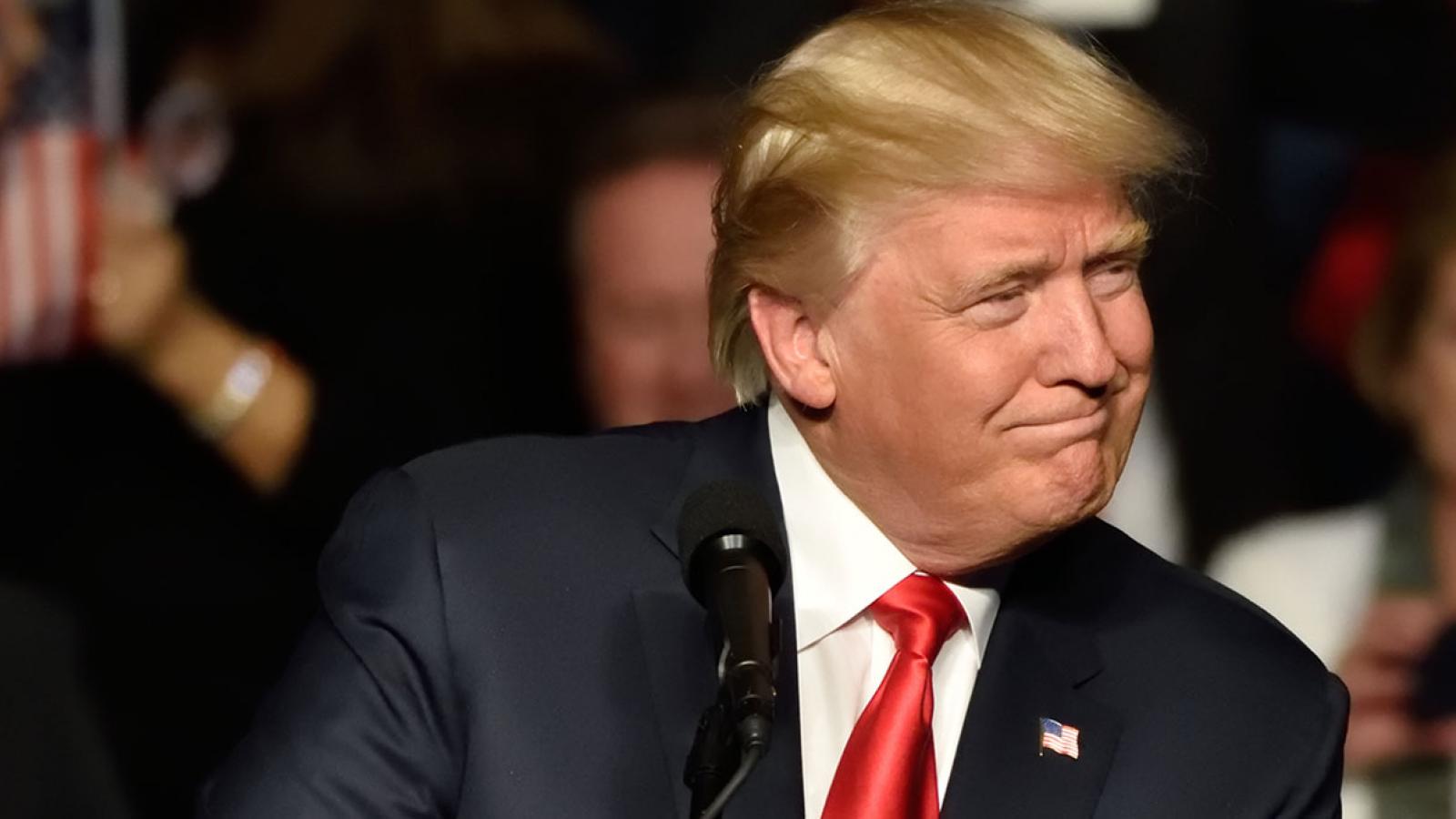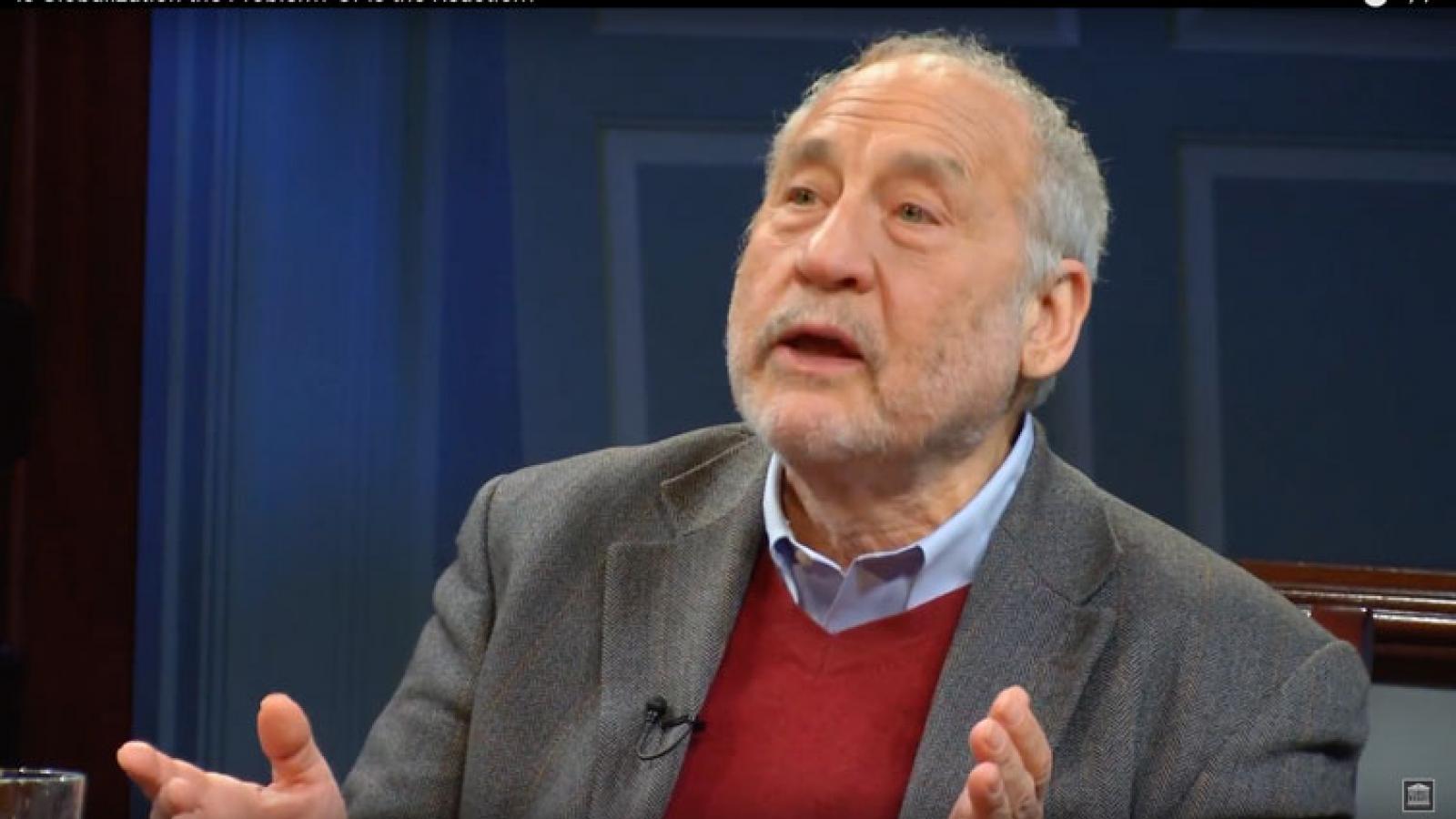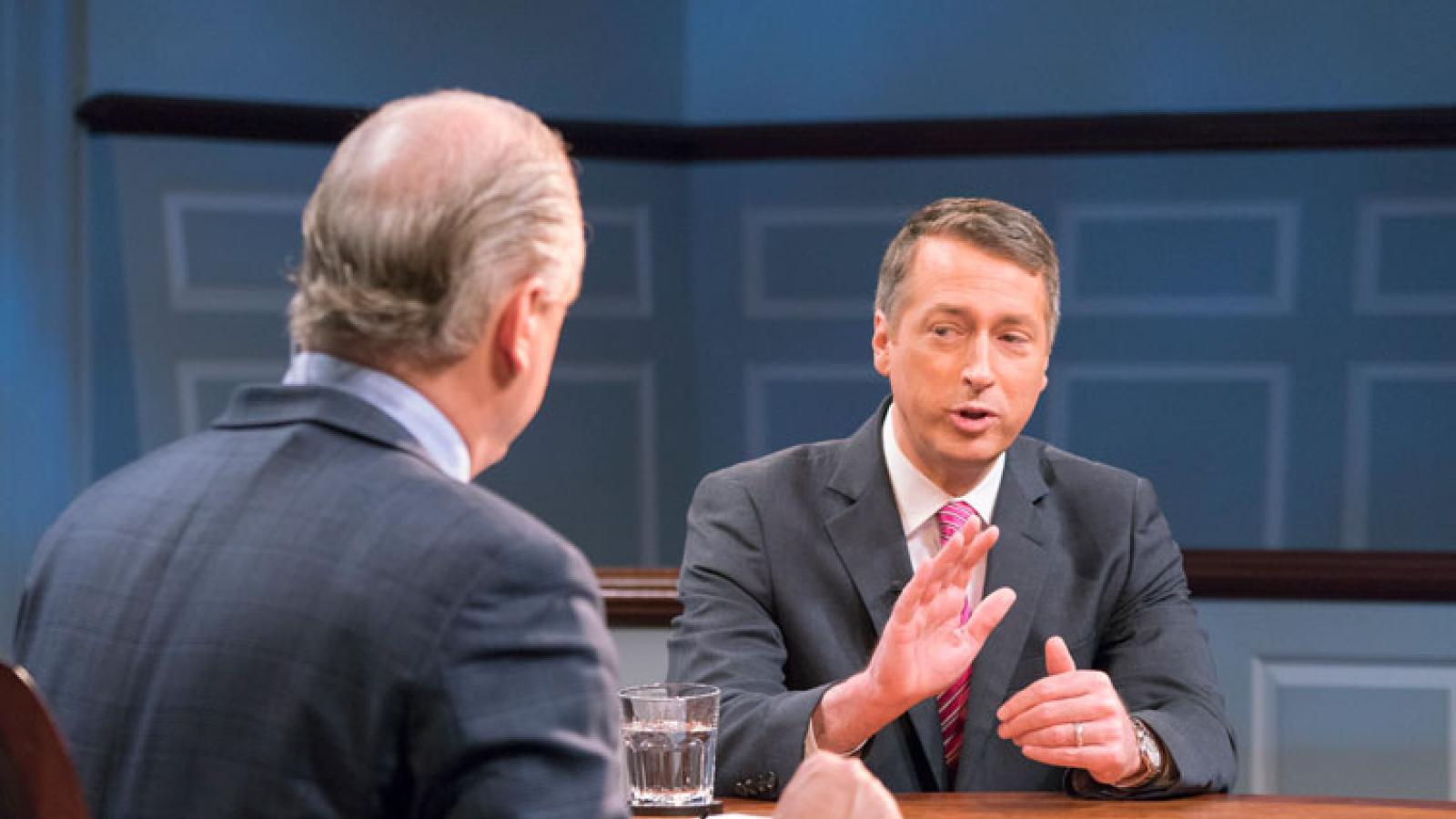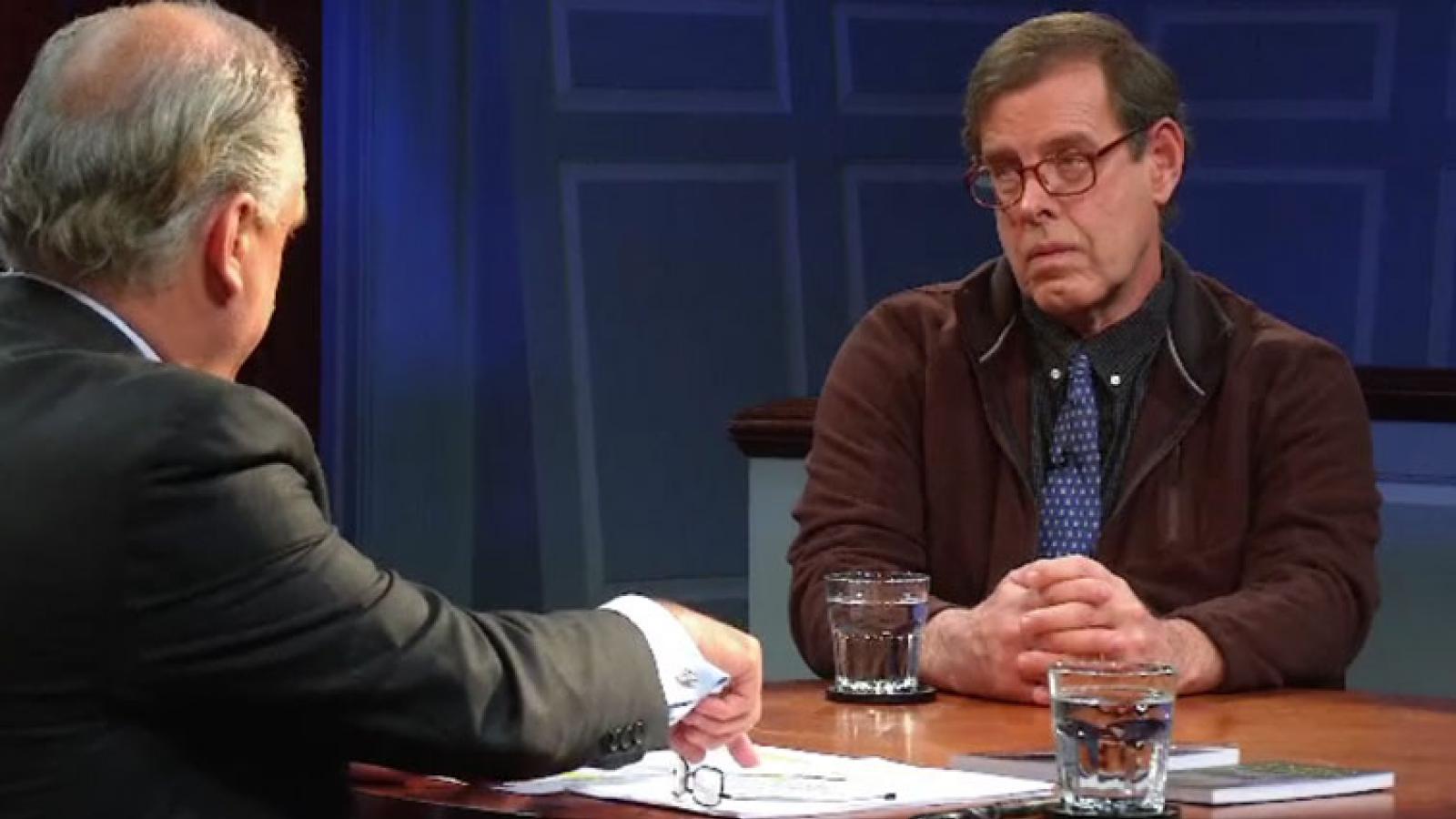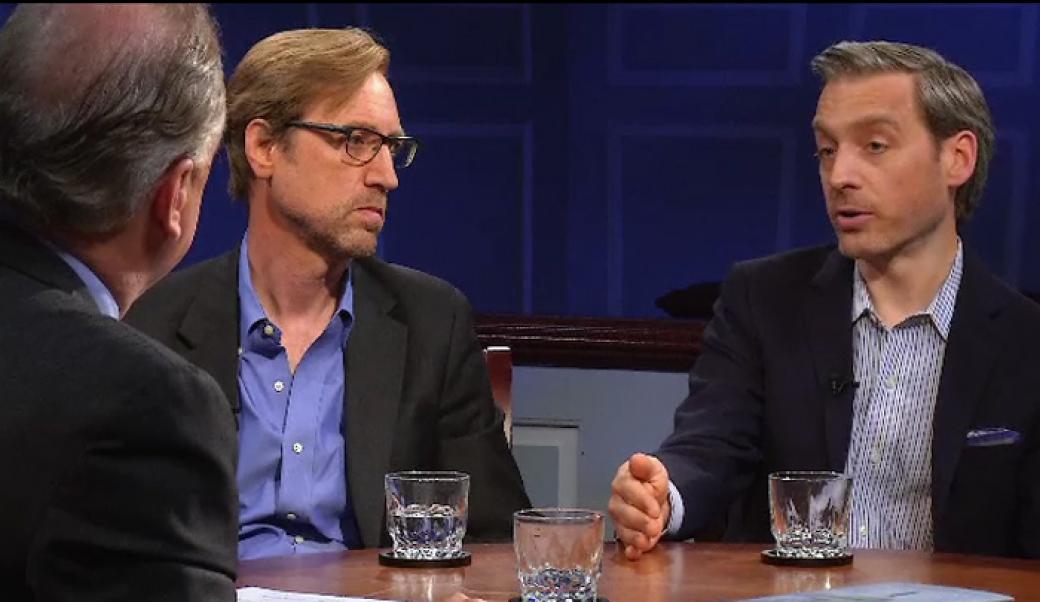About this episode
September 02, 2017
We take a look back at the beginning of the Trump presidency, from his campaign to the start of his first year in office. How have his promises played out in the real world of domestic politics?
Domestic Affairs
Trump's promises: Has he kept them?
Transcript
DOUGLAS BLACKMON This week on American Forum President Trump made big promises to America; has he kept them?
OPEN: It’s about history, policy, and impact. A new perspective on current affairs, bringing experience, insight, civility and scholarship to the urgent issues today. It’s about our past, present, and future. Your host: Pulitzer Prize-winning author and journalist Doug Blackmon. From the University of Virginia's Miller Center, this is American Forum.
BLACKMON: Welcome back to American Forum. I’m Doug Blackmon. Last September, long before the unexpected 2016 presidential election results, I began an episode of American Forum like this:
BLACKMON: And even if Donald Trump becomes president and the Republicans retain both the House and the Senate will the deep and bitter division among conservatives also continue to paralyze any serious government response to the major domestic issues of our time? Underemployment, education, the climate debate, health care, taxes, immigration.
BLACKMON: You can argue that that’s exactly what has happened. A Trump presidency…one party control of Congress and yet paralysis on many domestic issues. President Trump would disagree. He has touted his executive orders, the rise in the stock market, and putting conservative Neil Gorsuch on the Supreme Court as just a few of many successes. Critics say he has squandered the early, precious months of the new administration with political in-fighting over health care, and unnecessary controversies. Both sides may be right. In the next 30 minutes we’re going to look back at some of the debate over domestic issues featured on American Forum, and how the President’s First Year has matched up to advice our guests offered him from both the right and the left. Of course, we have to begin with President Trump’s promise to eliminate the Affordable Care Act and replace it with a plan that would extend health insurance to even more Americans, while costing everyone much less.
PETER WEHNER: Just a week or so before his inauguration, he gave an interview to Robert Costa at the Washington Post. Made headlines in the Post. And he said that he had a health care plan which was going to cover all people and cut costs, and he was going to push this plan. That plan doesn’t exist. His own advisors will tell you that that plan doesn’t exist.
THOMAS SUGRUE: And I do think that Obamacare is not going to exist in anything pretty closely resembling the form that it’s in now other than perhaps retaining coverage for kids until they’re 26 on their parents’ plans. Umm, otherwise I think there’s going to be some pretty significant shifts.
E. J. DIONNE: What is the argument about health care? The argument about healthcare is yes, we should preserve Obamacare, period, or yes, single payer is better, but we need to preserve Obamacare to get to single payer. There is no dispute that the government needs to do more to help people get health insurance.
BLACKMON: When Congress finally did get a bill in March, it became clear that contrary to President Trump’s promises, it was going to force millions of people OUT OF health coverage, and became less and less popular with Americans. The bill initially failed because even Republicans—with a majority in Congress—wouldn’t line up behind it. Here’s conservative journalist Rich Lowry from an episode we taped in May.
RICH LOWRY: The process was horrible, attempting to do it in three weeks was a big mistake, and the substance was just as bad. And it was a product of a real shotgun process, where they thought they were just going to do repeal initially, President Trump appropriately, in our view, pushed them to do replace as well, but as soon as you’re doing that it becomes much more complicated. So our advice has been kind of what’s been going on since the initial bill failed. Grind this out, work it with every faction, try to get the coverage numbers up, try to make it more substantively coherent and defensible and pass it, but you don’t need to do it the day after tomorrow, which has been the view from all along. There’s been a rush and haste makes waste.
BLACKMON: The Republicans did try again. The House passed a bill, but in the Senate, where the Republican majority is much smaller, it got stuck—until conservative Arizona Senator John McCain—who clashed repeatedly with candidate and President Trump singlehandedly sank Trumpcare, at least for now.
BLACKMON: Over the last two years, we’ve had a special project on American Forum, and at the University of Virginia’s Miller Center, where we produce this show. We've been collecting non-partisan advice from scholars and experts for how the new president could be most successful.
BLACKMON: The bigger picture of what happened on health care was that President Trump so far has shown little interest in one of the most frequent and basic suggestions from our guests—encouraging a less polarized atmosphere in Washington and being open to compromise between Republicans and Democrats. Trump biographer Marc Fisher says Republican in-fighting and political chaos is what some inside the White House really want, namely, chief strategist Steve Bannon.
MARC FISHER: And what the Bannon people want to do has nothing to do with the Republicans and Democrats, nothing to do with left and right. They want to shake up the system, tear down the administrative state, as Bannon says, and so they’re not interested in party discipline. When the party breaks apart as we saw in the health care debate, that’s fine with them. That’s actually a good thing for them. Of course, when we think about this through tra—traditional Washington lenses, then we say, “Oh, the Republicans are a mess.” But from a certain portion of the Trump White House’s perspective, that mess is what they’re aiming for.
BLACKMON: Republicans in Congress are facing very difficult choices these days about when to support the president and when to oppose him. Overall, more than 60 percent of all Americans disapproved of Donald Trump’s performance in a recent poll. But a large majority of Republican voters still support him.
BILL KRISTOL: They have a big interest in trying to keep it together, because you don’t do well in House elections if you’re you know, have your own voters are unhappy at you, with you because you’re not supporting the president. And the Democrats, if they want someone who’s going to fight Trump, why don’t they just—they’ll just elect a Democrat, right? So, being an anti-Trump Republican is fine for me, but as an electoral matter—is a tough thing to be. I mean, I think they don’t get quite enough sympathy—I probably don’t give them as much sympathy as I should because I get annoyed at them for not standing up. But it’s a, as a, you know, it’s a real matter going home and explaining yourself when you’re sort of, “Well, I wish him well and I support him on A, C, and D, but I’m not with him on B. And on F, I’m really unsure.” It’s just a tough message for a politician.
BLACKMON: Democrat Melody Barnes adds that once you get past the politics, the process of governing is also tough. That’s the same kind of process that Senator John McCain talked about recently on the Senate floor before voting no on the Republican health care proposal.
MELODY BARNES: And so day after day after day, people often hear that there are very simple solutions to what are very complex problems. And, in fact, policy-making requires what is—can be eye-rollingly dry to a lot of people, but a very methodical process of trying to work your way through very complex issues, and the intersection across very—across significant institutions to try and solve those problems. And what often—what—not often. What feels very difficult and painful for people—and that has to be acknowledged, sitting at their kitchen tables—and that people naturally want to be solved tomorrow, or actually yesterday, then you end up with people who are very, very frustrated at the slow process of government, when in fact—going back to Alexander Hamilton—when, in fact, we know government was, in fact, designed to move quite slowly.
BLACKMON: Slowly, yes. But Americans from the right and the left don’t seem to be happy with this level of snail’s pace. Here’s Ryan Lizza, the New Yorker reporter whose story brought an inglorious end to the ten-day term of Anthony Scaramucci as White House communications director.
RYAN LIZZA: Until compromise and negotiation is no longer a dirty word for both parties, nothing will get done in Washington and right now a core Republican belief is if you compromise with Democrats you have betrayed your principles and our government can’t run if that’s a premise.
BLACKMON: Lizza said that while Barack Obama was still president. It’s interesting that the same argument is being made against Democrats now that Republicans are in power. And what about trust in Congressional leadership in the aftermath of this historic presidential election? Here’s conservative icon Bill Kristol, who has little good to say about President Trump, but continues to back Republican House Speaker Paul Ryan.
BILL KRISTOL: I think he miscalculated the health care bill, but in the big scheme of things, Paul Ryan is a very impressive guy. I mean, he’s a policy wonk, he’s a man of principle and integrity. And if you had told me, again, that five years ago, the Paul Ryan whom I knew when he was a young back-bencher or staffer before that was going to be the Republican speaker of the house, replacing the kind of more wheeler-dealer types we’d had in there, and people who were much older who’d been in there before, I would have said, wow, that’s impressive, too.
BLACKMON: Another refrain we heard from many guests was that it would be critical for the new president to address the sense among so many Americans that they were being “left behind” by an increasingly unfair economy. Part of that means doing something about social afflictions, like the opioid epidemic, that seem to be associated with the American Dream slipping away. Listen to Nicholas Eberstadt, of the conservative American Enterprise Institute, who argues there are many more unemployed men than our official statistics indicate and that about half of them are taking painkillers.
NICHOLAS EBERSTADT: So it’s not just spending all day watching TV, it’s spending all day watching TV stoned.
BLACKMON: Wow.
NICHOLAS EBERSTADT: What’s happened over the last 20 years is that painkiller and heroin addiction has gone mainstream, main street, and it’s grown disproportionately among the so-called Anglo population, which is why deaths from overdoses, different types of overdoses, can now, on a national scale, be higher than deaths from traffic accidents or gunshots, and this is a white thing.
BLACKMON: One undeniable success for President Trump was the naming of Neil Gorsuch to a seat on the Supreme Court. It was still vacant because Republicans refused to consider President Obama’s nominee during his last year in office.
RICH LOWRY: He didn’t nominate Judge Gorsuch because Donald Trump is a constitutionalist deep in the marrow of his bones and wants a justice who is going to check executive power and the administrative state. No, he did this because it was necessary to keep part of the coalition onboard, which is social conservatives and traditional conservatives. He came up with a list, he said I’m going to choose from this list, and he hued to that promise. So that was a sign, in a way, that some of us at National Review doubted, that you can do transactional politics with Donald Trump.
BLACKMON: Another area of big promises and lots of advice from our guests was on immigration—and President Trump's proposed Wall at the Mexican border.
He talked about it constantly on the campaign trail. And American Forum guests gave strongly conflicting advice. As president, Trump has struggled to make good on the Wall—and especially his demand that Mexico pay for it. But tucked in a recent bill to fund the Pentagon was 1.6 billion dollars to get it going. The House passed that bill in July. Upcoming Senate debate promises to be heated. And whatever you think of the Wall, you have to agree there are many sides to that issue.
BLACKMON: There’s nothing wrong with a country controlling its border, though. It’s just a bottom line thing. Isn’t that the case? And don’t—doesn’t pretty much every developed country in the world have a fence on the borders that it wants to control? TAMAR JACOBY: Yeah, Donald Trump is right about one big, important thing, and that—that’s the change that I think we agree on. Immigration policy has to be in American interests. Yes, rights are important. Yes, you want to treat people decently. But we have to think about our policy. The question is, is Donald Trump going about it the right way? And is the wall going to accomplish what he wants? And is it the most—the best way to accomplish it? I think probably not.
BLACKMON: Do you see that the same way, Gary?
GARY FREEMAN: Not quite, because I think that the Wall and Trump’s promise to build a wall was absolutely key to his nomination in the Republican Party and then becoming the president. It really roused people.
BLACKMON: In our First Year Project, Gary Freeman also urged the president to sharply limit refugees from predominantly Muslim countries. President Trump did follow that advice, with his controversial so-called “travel ban.” Many traditional conservatives welcomed that. Liberals and some others were outraged.
RICH LOWRY: Even when we’ve been most critical of Trump, the issue where we found most common ground with him is on immigration, where I think he’s challenged a lazy establishment consensus on both the left and the right.
BLACKMON: One of the things I love most about hosting American Forum is that I always learn things not covered much in the regular news media. That was true as well in the area of immigration, when Professor Geraldo Cadava explained the unexpected role that illegal immigrants play in our presidential voting.
GERALDO CADAVA: Even though undocumented, uh, people are not—undocumented immigrants are not voting in elections, most Latinos, Mexican Americans in particular who are voting in elections, have family members who are undocumented, know someone who’s undocumented. Sometimes they’re in mixed-status families where one of the two, um, people involved in a relationship has legal status and votes. One does not. So in those cases, you know the—the living conditions and experiences of the family are very much dependent on the one person’s legal status, because they’re able to vote and kind of advocate for their undocumented half.
BLACKMON: Issues of race were front and center in many American Forums over the past year looking at it from all sides. In February, we hosted former Attorney General Eric Holder and Black Lives Matter leader Deray Mckesson for a conference at the Jimmy Carter Library in Atlanta seeking to get advice from different generations and political perspectives about how President Trump could make progress on the country’s deep racial divide. Deray came from the perspective of a young black man who had just witnessed eight years of the first African American president and who became an activist after the 2014 killing of Michael Brown by a police officer in Ferguson Missouri.
DERAY MCKESSON: I went to Ferguson, I’ll never forget, the second night that I was in St. Louis was the first night of the curfew, if any of you remember that, it was a midnight curfew, eight o’clock, we start getting tear-gassed. And I remember getting tear-gassed for the first time and I was like this is not the America I thought I knew, right, that like I didn’t do anything. The police killed Mike, we didn’t do anything, we shouldn’t have to protest, right? We shouldn’t have to be outside. We’re out here and we are like running from people with rifles and we didn’t do anything, and it was in that moment that I was like something is wrong, like this is broken.
BLACKMON: He said that just weeks after the Trump inauguration, and former Attorney General Holder predicted that we won’t really know how the president is going to deal with race until something very bad has happened.
ERIC HOLDER: But it’s obvious that there’s going to be a test, that there is going to be an incident in which there’s going to be something on tape, that some police officer is going to shoot a black man someplace, unfortunately I think this is likely to happen, and then the question will be, and it will depend on what the tape actually shows, then we’ll know, we’ll get a sense of what; this attorney general, what this president, what the Justice Department’s reaction is going to be.
BLACKMON: Most of our experts interviewed in the “First Year Project”—whether conservative or liberal—urged President Trump to tone down his comments about failing minority neighborhoods, and to push forward on efforts begun by President Obama to improve police practices and reduce confrontations between officers and citizens. A big exception to that was Heather MacDonald of the Manhattan Institute. She had a completely different point of view, saying there is too much focus on race and too much criticism of police.
HEATHER MACDONALD: Last year the police fatally shot about 987 people—50 percent of those were white. We’d never know that from the media coverage. Among the white victims was a 50-year-old man in Tuscaloosa, Alabama, it was a domestic assault, call. He ran at the officer with a spoon. He was fatally shot. If he’d been black, we all would know his name.
And I do think that the Black Lives Matter narrative which has been accepted by President Obama, and I would say amplified and certainly abled by the mainstream media that says that we’re living through this epidemic of racially biased police shootings of blacks is simply not true.
BLACKMON: Beyond the controversies over police shootings of African American citizens, there were a lot of conflicting perspectives over how President Trump should address broader racial issues.
THOMAS SUGRUE: There’s been a lot of poisonous rhetoric, a lot of anger and lifting that lid off I think has potentially some really some significant long term damaging consequences.
KIMBERLEY STRASSEL: There are a lot of things you can accuse Donald Trump of, uh, and a lot of things he sort of wears on his sleeve you just can’t get away from. I do find it difficult, and I think if you talked to anybody out there and you look at the history of him, but uh the idea that he is a racist, I find a little bit harder to believe.
BLACKMON: It is hard to get into someone’s head and heart and really predict how they feel about race. Trump biographer Marc Fisher, who you met earlier in the show, had a story he believes gives insight into President Trump’s mindset. On his way to interview then candidate Trump, Fisher had asked a cab driver how he would test whether Trump was racist, as some have claimed. The cab driver responded, “I would have to see love in his heart.”
MARC FISHER: So we get to Trump’s office and I tell this story to Trump, and I said “What would you say to that taxi driver? How can you persuade someone that you’re not a racist?” It’s just a hard charge to rebuff. And Trump said “I’m the least racist person you’ll ever meet.” And I said “Well ok, well how would you go about showing that?” And he picks up a newspaper from his desk and it’s a copy of Don King, the boxing promoter owns a newspaper out in Ohio, and it’s an endorsement from Don King of Donald Trump. And he said “See, Don King is my friend.” And it was like that’s what you come up with? But he did go on to add that Mike Tyson is a friend.
BLACKMON: Libertarian presidential candidate Gary Johnson was a guest on American Forum in the final weeks of the 2016 presidential election—when it briefly appeared that his third party candidacy might be getting momentum. He was optimistic about racial issues.
GARY JOHNSON: This is an issue, discrimination is an issue, and I think as a country we’re coming to grips with it faster and better, and resolve it at a speed that in the years past we would not have been able to achieve.
ERIC HOLDER: Let’s face, in a very honest way, a frank way, the racial issues that continue to divide us. We are really adept as a nation, and it’s understandable, in kind of pushing to the side, putting back in the bottle, racial issues, that unless we talk about them, unless we’re prepared to ask hard questions and face some painful truths, we’re never going to make progress. We’ve got to do that; we have to do that.
BLACKMON: Early in the Trump presidency, newspapers were filled with articles about the president’s heavy use of Executive Orders. By late July, he had already issued more than 40. Comparatively, President Obama didn’t have that many in his entire first year as president. We took a deep dive into that with constitutional law scholar Sai Prakash.
SAI PRAKASH: There are drawbacks and benefits of executive orders, right? The benefit is you can do so unilaterally because you think you have constitutional or statutory authority. What’s the drawback? The drawback is the next president can come in and repeal it. If it’s—if you go to Congress and get a statute, they can’t easily repeal the statute. And so, it’s a temporary fix, but it’s unilateral, pursuant to statutory authority.
BLACKMON: One of the president’s first executive orders was pulling out of the TPP, the Trans Pacific Partnership—a trade agreement with Asian countries negotiated by President Obama but never passed by Congress. It was President Trump’s first grenade into the trade debate.
JOSEPH STIGLITZ: Where he’s going is towards a global trade war, and if we go to that—if we had that global trade war, our standards of living are going to go down. Our jobs are going to go down because we depend very heavily on exports. You know, China is not going to buy our airplanes if we’re putting a forty-five percent tariff on their goods.
NICHOLAS EBERSTADT: What I learned in economics was that if you want to get rid of all of the rest of the manufacturing jobs, you might as well have a great big trade war right now, because that will do it. That’s a way that everybody loses.
RICH LOWRY: It’s not clear it’s a protectionist administration. If there’s one issue he’s been completely consistent on for 40 years, is that we’re getting ripped off by bad trade deals and we’re suckers, and all these things need to be ripped up and negotiated by the one person on the planet who is competent enough to negotiate them, Donald Trump. So far that’s not happening and we’re getting reports of intense debates within the administration about how aggressive they should be on trade.
- : Another big promise of President Trump during the 2016 campaign was massive tax reform. In the aftermath of the failed health care debate, the Republican controlled Congress telegraphed it was ready to get started on that. So President Trump wants to cut the corporate tax rate, eliminate the so-called “death tax,” get rid of the Alternative Minimum Tax, and reduce the number of tax brackets from seven to three. On those issues, we heard from all sides.
GARY JOHNSON: I would eliminate income tax, I would eliminate corporate tax, and I would replace it with one federal consumption tax.
JOSEPH STIGLITZ: We have to have more progressive taxation. We have to tax corporations more, not less, and that will give us the revenues so that everybody will be better off.
KIMBERLEY STRASSEL: It would be much better to have a flat tax code because, and there’s no judgment involved in that whatsoever.
BLACKMON: As we wrap up this week, my thoughts turn back to the 2016 election and the lessons our guests and viewers drew from it. One of the things we learned is that a significant number of people in this country feel left out of the economic recovery and don’t think their voices are being heard. Donald Trump clearly understood that and tried to answer it.
GERALD SEIB: He saw that people believe that America is losing its edge, that it is being taken advantage of by foreign competitors in the economic sphere and in the security sphere. He saw that people aren’t comfortable. They think they’re losing control of their country. They don’t recognize the country that they live in anymore. It’s not the one I grew up in. He recognized all those things and validated those concerns for people, and they appreciated it. And I have to admit that he saw the depth of those feelings more accurately than I think those of us in the mainstream media did, and that’s why he won. Let’s face it.
SAM TANNENHAUS: And there's a lot of America that doesn't get talked about by people like me. We talk about gender, we talk about race, we talk about transgender, we talk about people's sexual choices, but we don't really talk about our coastlines and rivers, our prairies and plains.
BLACKMON: In our upcoming year on American Forum, you'll hear much more about this issue. With more guests offering possible solutions to Washington gridlock, and nonpartisan advice for President Trump—things you won’t hear much of anywhere else. Community activist Eric Liu notes that solutions that might actually work, won't come easy and they won't be possible unless American citizens are ready to reach across the ideological divide.
ERIC LIU: I’m not interested in—in patronizing Appalachia. I’m not interested in really kind of saying, “Oh, you poor, suffering, low-income white person. You know, your needs and feelings and fears must be given priority to everybody else.” I’m interested in saying to them, “I get that you’re scared. I’m scared, too, but be a grownup. Join me in this conversation about what we’re going to do together.” Right? That’s a different way of dealing with each other than just saying—bending over backwards, as many liberals are doing right now, um, to over-elevate, uh, the—the sense of grievance that a lot of these folks have had.
BLACKMON: That’s our program for this week. Thanks for joining us to revisit the debate thus far over President Trump’s promises to middle America, and the advice our guests gave him for a successful First Year. We do this to remind ourselves that making policy decisions for our future is hard. There aren’t just two possible answers to every problem. There are dozens, or hundreds. We hope to give you food for thought each week, and informed viewpoints that help citizens develop opinions of their own and move forward. As crazy as the past year has been, our system still works. If you have a question or comment about what you’ve seen on this episode, you can contact me directly. My twitter handle is @douglasblackmon. My email address is on the screen. See you next week.
